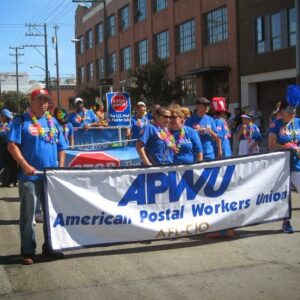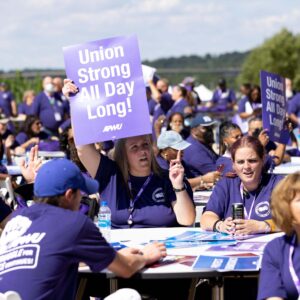July 31, 2014
Danny Glover Tells Convention: ‘I’m In!’
Actor Danny Glover gave an impassioned speech on the final day of the APWU’s 22nd Biennial Convention, declaring that he would be part of the fight to keep the Postal Service in the hands of the people.
As the son of postal workers, Glover described how his parents’ involvement in the union influenced his life. “My parents were engaged in change,” he said, pointing out that they became postal employees shortly after the U.S. armed forces and federal employment were integrated. “It was in the midst of a great movement in the country,” he said.
“What was so impressive to me as a young child was the way they felt about the union. It was not just what they did, it was the way they felt about making the workplace better for workers all across the county.”
“Because my parents lent their voice, from the outset, my life was guided by their passion,” he said. The renowned actor is a long-time social activist, who has recently given active support to Nissan workers in Mississippi who are trying to organize a union.
“The old stories were great stories,” Glover said. “But we have new stories that we have to create.”
“Automation has changed so much,” he added. “The evisceration of power of labor unions, the attempt to compromise our one great victory – that of collective bargaining – is on the line,” he said.
The fight against turning over postal duties to Staples and the campaign to use the USPS “for the many varied services it has the capacity to perform” are important because they will strengthen the Postal Service’s role in our lives, Glover said.
“We own it,” he declared. “Not the private sector. Not big business. But we, the people, own our post office,” he said. “And we’re going to fight for that and stand up for that and we will win.”
“We have a lot of work to do,” he said. “It’s a moment in time. We have to come together, stick together. We’ve got to support each other, we’ve got to build with each other,” he added, before declaring, “I’m in.”
Following Glover’s speech, convention delegates passed a resolution naming him an honorary member of the APWU.
Resolution Sets Goals for Contract Negotiations
On July 25, the last day of the APWU’s 22nd Biennial National Convention, delegates adopted a resolution that spells out the priorities for the upcoming contract negotiations with the USPS.
After voting to adopt over 125 other labor-management resolutions earlier in the week, delegates passed Standing Up and Fighting Back. The resolution encouraged the union’s national leadership to “mobilize our members and galvanize postal workers, friends of labor and concerned citizens to oppose and change the priorities of the Postal Service.”
Acting as a stamp of approval for this year’s national convention theme, it declared that the union will approach contract negotiations by standing up and fighting back against USPS attempts to cut service and privatize jobs:
- STAND UP for conversion of Postal Support Employees (PSEs) to career status and for reliance on a career workforce and FIGHT BACK against any Postal Service attempt to maintain a low-paid, low-benefit, mistreated non-career workforce;
- STAND UP for decent wages and benefits from hiring to retirement and FIGHT BACK against any Postal Service attempt to maintain or increase multi-tiered and substandard pay and benefit schemes;
- STAND UP for the competency, dedication and hard work of our members and FIGHT BACK against any Postal Service attempt to continue contracting, expand contracting or continue to have supervisory personnel do any work that postal employees can perform;
- STAND UP for full-time work and FIGHT BACK against any Postal Service attempt to define full-time work as anything less than 40 hours;
- STAND UP for first-rate service and a vibrant, healthy and growing Postal Service and FIGHT BACK against any Postal Service attempts to continue to reduce service standards, close plants and post offices, and reduce days of delivery and hours of retail operations and door deliveries.
Other Business
In other convention business, delegates approved resolutions adopted at conferences immediately preceding the convention that focused on topics of specific interest to each craft.
Delegates also adopted the recommendations of the Legislative, Human Relations and Safety and Health committees.


